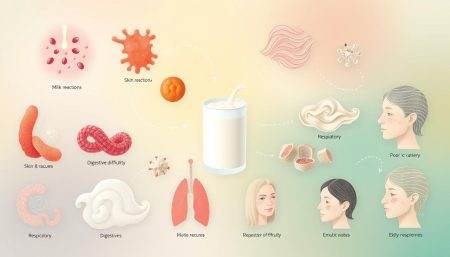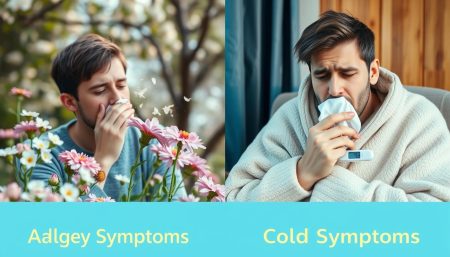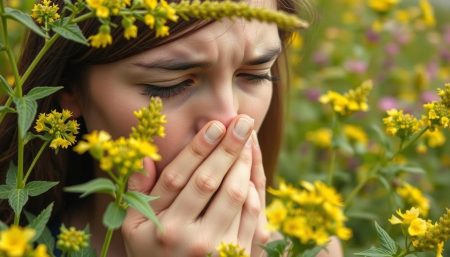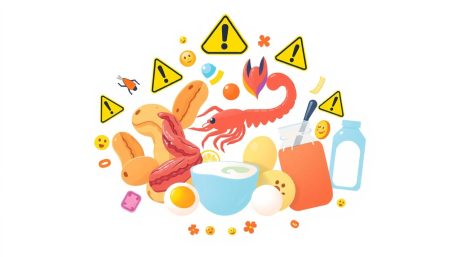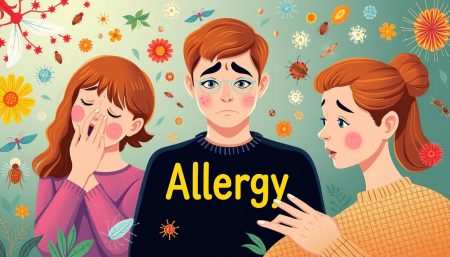When trees and flowers bloom, pollen allergy brings discomfort. For those sensitive to pollen, knowing the symptoms of pollen allergy is key. It’s not just about sneezes and sniffles. It’s about understanding the body’s response to pollen.
Many overlook pollen allergies, thinking they have a cold. But the signs are clear, showing up every season. These symptoms are common and can be managed.
This guide helps you understand allergic reactions to pollen. By paying attention to your body’s signs, you can enjoy the seasons more.
Key Takeaways
- Identifying early symptoms of pollen allergy can significantly improve quality of life during peak seasons.
- Distinct seasonal allergy signs help differentiate pollen allergies from the common cold.
- Greater awareness enables affected individuals to take proactive steps in managing their condition.
- Knowledge of allergen triggers informs better decision-making around outdoor activities.
- Understanding the body’s reaction to pollen is essential for seeking appropriate medical advice and treatment.
Understanding Pollen Allergy and Its Impact
Pollen allergy, also known as allergic rhinitis, affects many people’s daily lives. It’s important to know how common it is and how it works. This helps us understand the immune response to pollen.
What is Pollen Allergy?
Pollen allergy, or hay fever, makes the immune system overreact to pollen. This leads to symptoms like sneezing and itchy eyes. The immune system sees pollen as a threat and attacks it, releasing histamines.
How Common are Pollen Allergies?
Allergic rhinitis is more common than you might think. It affects up to 30% of adults and 40% of children worldwide. Changes in lifestyle and environment have made it more common.
The Science Behind Allergic Reactions to Pollen
The body’s reaction to pollen is complex. It involves pollen grains and the immune system. This process, called the pollen immune response, leads to symptoms like sneezing and itchy eyes.
| Component | Function in Allergic Response |
|---|---|
| Allergens (Pollen) | Trigger the immune system’s reaction |
| Antibodies | Identify and bind to specific allergens |
| Histamines | Chemical mediators that cause allergy symptoms |
| Immune Cells | Release histamines in response to allergens |
This section has covered the basics of pollen allergy. It shows how it affects many people and how it works. Learning more about these immune reactions helps us manage pollen allergy better.
Recognizing Pollen Allergy Symptoms
It’s key to spot pollen allergy symptoms early to manage them well. These symptoms can be tricky to figure out, especially if you’re new to allergies. This often means people wait too long to get help.
Allergy symptoms can vary, but some are clear signs of pollen allergies. Look out for nasal congestion and watery eyes. You might also feel itchy eyes and throat, or have sinus pressure sometimes. Spotting these signs early can really improve your life when pollen counts are high.
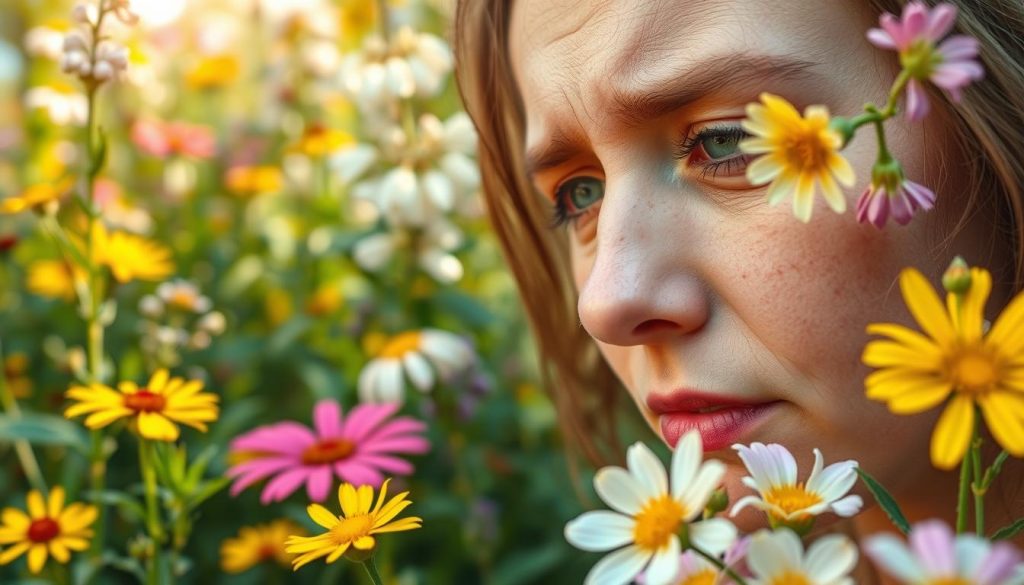
- Nasal congestion: Often one of the first signs, this symptom can disrupt daily activities and sleep patterns.
- Watery eyes: This reaction is the body’s way of flushing out irritants, including pollen.
- Sneezing and itchy throat: Frequent sneezing and an itchy throat are common responses to pollen inhalation.
- Sinus pressure: As nasal congestion worsens, it can lead to uncomfortable sinus pressure.
While these signs hint at pollen allergies, they can also show up in other allergies. This makes it hard to know for sure without help. If you keep getting these symptoms or they get worse, see a doctor. They can confirm if you have an allergy and help you manage it.
Pollen Count: A Key Factor in Allergy Symptoms
Knowing the pollen count helps manage daily life and lessen allergy symptoms. By tracking air allergens, people can plan outdoor activities better. This reduces discomfort from pollen allergies.
How to Check the Daily Pollen Count
Pollen forecast technology makes it easy to keep up with pollen counts. Weather websites and apps often have this feature. They give daily updates, helping prepare for days with high allergen levels.
Interpreting Pollen Levels and Allergy Severity
Pollen levels are reported as “low,” “moderate,” “high,” or “very high.” Each level shows how severe symptoms might be. This depends on the person’s allergies.
Here’s a table showing how pollen counts can affect allergy sufferers:
| Pollen Count | Symptom Severity | Recommended Actions |
|---|---|---|
| Low (0-2.4) | Mild to none | General outdoor activities okay |
| Moderate (2.5-4.8) | Moderate | Limit time outdoors during high pollen release times |
| High (4.9-7.2) | Severe | Reduce outdoor exposure, take antihistamines |
| Very High (7.3+) | Extreme symptoms | Stay indoors, use high-efficiency particulate air (HEPA) filters |
Using pollen forecasts can greatly improve life during allergy season. It helps avoid high allergen levels and lessens discomfort from allergies.
Seasonal Allergies vs. Perennial Allergic Rhinitis
It’s important to know the difference between seasonal vs. year-round allergies. Both are caused by the body reacting to things in the environment. But, their causes and how to treat them are quite different.
The Difference Between Seasonal and Perennial Allergies
Seasonal allergies, or hay fever, happen when pollen from trees, grasses, and weeds gets in the air. This usually happens in spring and fall. On the other hand, perennial allergic rhinitis is always present. It’s caused by things like dust mites, pet dander, and mold, which are always around.
Identifying Triggers Beyond Pollen
People with chronic allergic reactions need to watch out for more than just pollen. Indoor allergens like pet dander, dust mites, and mold are big problems all year. Knowing what these are and how to avoid them is crucial for feeling better.
| Allergen Type | Common Sources | Seasonal/Peak Times |
|---|---|---|
| Pollen | Trees, grasses, weeds | Spring and Fall |
| Dust Mites | Bedding, carpets, upholstered furniture | Year-Round |
| Pet Dander | Cats, dogs | Year-Round |
| Mold | Damp areas: bathrooms, kitchens, basements | Year-Round, increases with humidity |
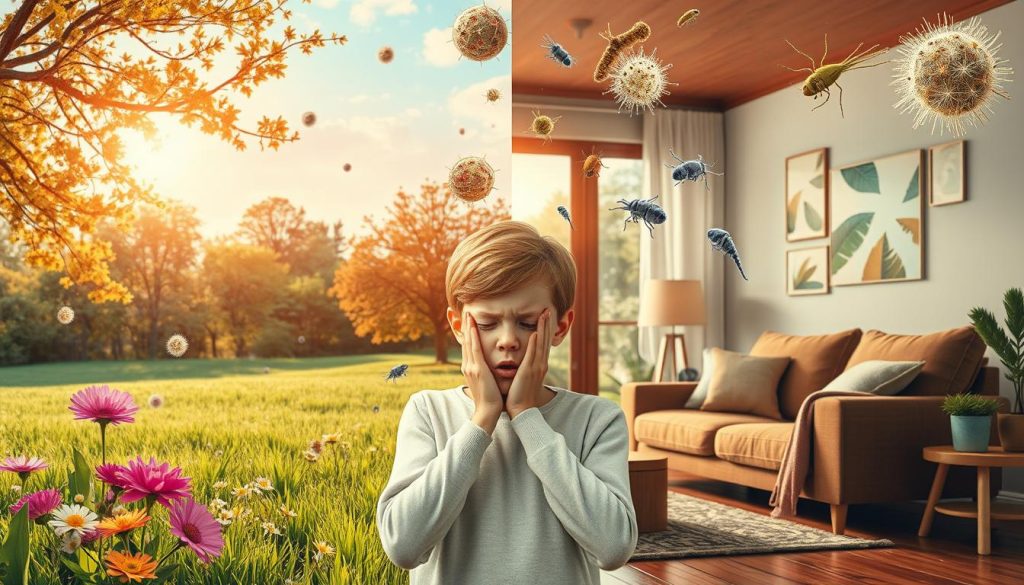
When to Suspect You Have a Pollen Allergy
As the seasons change, many people start to feel symptoms that might be pollen allergies. Spotting these signs early can lead to quick testing and better management.
Typical Onset of Pollen Allergy Symptoms
Spring or early summer often brings respiratory and nasal issues as plants pollinate. These symptoms can seem like a cold, but their timing and lasting nature suggest a pollen allergy. You might sneeze, have watery eyes, and a runny nose, especially when pollen counts are high.
Signs That You Should Get Allergy Testing
It’s important to know if your symptoms are from pollen. If you get these symptoms every year at the same time, it’s a sign to see a doctor. Testing can show what you’re allergic to and help you find the right treatment.
| Symptom | Common Cold | Pollen Allergy |
|---|---|---|
| Duration | 3-7 days | Weeks to months, or as long as exposed to allergen |
| Pattern of Emergence | Year-round | Seasonal; corresponds with pollen dispersal |
| Response to Antihistamines | Poor | Good |
Knowing the signs of pollen allergies is key to avoiding big allergic reactions. With the right knowledge and testing, you can enjoy your life more during allergy seasons.
Pollen Allergy Symptoms: A Closer Look
Exploring pollen allergies reveals the importance of knowing symptoms and their effects on daily life. Pollen can cause eye irritation and sinus pressure. These symptoms impact both physical health and daily activities.
Itchy Eyes and Vision Disturbances
Eye irritation from pollen is common in seasonal allergy sufferers. They often have red, itchy, and watery eyes. This can lead to discomfort and even vision problems.
Using antihistamine eye drops and avoiding allergens helps manage these symptoms. It’s important to act quickly to prevent further irritation.
Sinus Congestion and Pressure
People with nasal allergies often face sinusitis symptoms. These include pressure, facial pain, and a stuffy or runny nose. To manage these, a mix of decongestants, nasal sprays, and sometimes prescription meds is needed.
Sneezing and Runny Nose: Managing Day-to-Day Discomfort
Managing allergies daily is crucial, especially for sneezing and runny nose. Keeping tissues on hand and using saline sprays can help. Staying indoors during high pollen days and using air purifiers also helps.
Knowing these symptoms and how to manage them can greatly improve life during allergy seasons. Proper care and prevention not only ease discomfort but also prevent symptoms from getting worse.
Common Misconceptions About Pollen Allergies
It’s important to clear up allergy myths and misconceptions about pollen allergies. This helps people understand and manage their allergies better.
Many think pollen allergies only happen in spring. But, pollen allergy facts show that pollen comes from different plants at different times. This means symptoms can happen in many seasons, not just spring.
Some believe moving to a new place can fix pollen allergies. But, while a new place might help a bit, allergies can come back. This is because you can still get used to new plants over time.
It’s also a myth that kids can’t get pollen allergies. The truth is, pollen allergies can start at any age. It depends on how much you’re exposed and your genes.
| Myth | Fact |
|---|---|
| Allergic only in spring | Allergies can occur in any season due to different plants pollinating. |
| Moving eliminates allergies | Relocation might reduce symptoms temporarily; new allergies may develop. |
| Children are immune | Children can develop pollen allergies, often noticed once they start school. |
By clearing up these allergy myths and sharing pollen allergy facts, we can help people manage their allergies better. This is good for individuals and families alike.
The Link Between Hay Fever Symptoms and Pollen Allergies
Understanding the connection between hay fever and pollen allergies is key. This section aims to clear up any confusion. It will explain the differences and similarities between these conditions. Knowing this helps in getting the right diagnosis and treatment.
Is Hay Fever the Same as a Pollen Allergy?
Many think hay fever and pollen allergy are the same. But, hay fever, or allergic rhinitis, can be caused by pollen and other allergens too. This means not all hay fever is from pollen, but pollen is a big part of it.
Hay Fever Symptoms That Mimic a Cold
Diagnosing hay fever can be tricky because its symptoms are similar to a cold. Symptoms like sneezing, runny nose, and nasal congestion are often mistaken. This can lead people to treat it like a cold instead of an allergy.
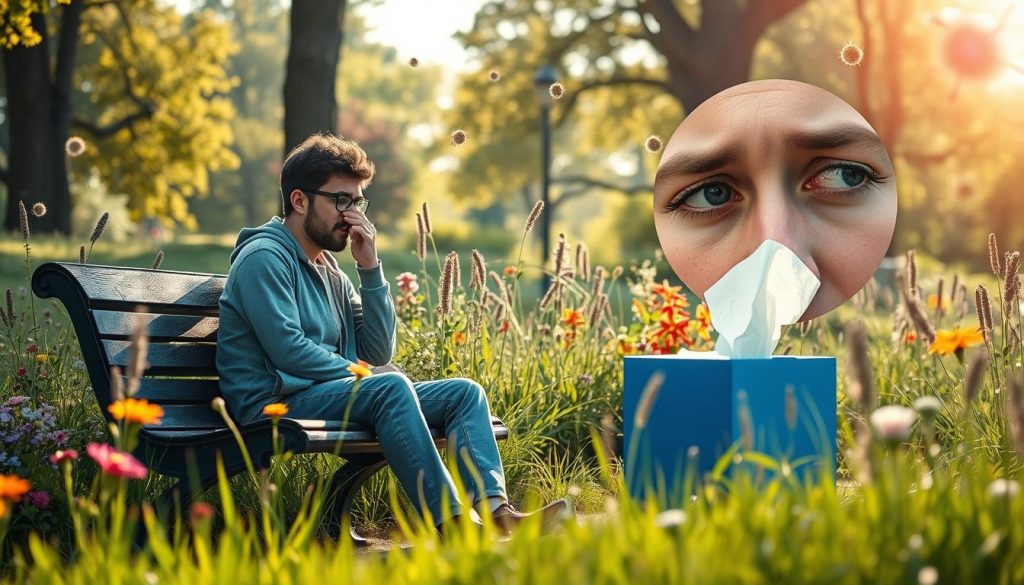
| Symptom | Cold | Hay Fever |
|---|---|---|
| Duration | 3-7 days | As long as exposed to allergen |
| Nasal Discharge | Thick, yellow | Thin, clear |
| Time of Year | Mostly winter | Spring or fall, depending on pollen |
| Sneezing | Less frequent | Often and severe |
| Eyes | Rarely affected | Itchy and watery |
In conclusion, understanding the differences between hay fever and pollen allergies is crucial. Recognizing the symptoms that are similar to a cold is important. This helps in getting the right treatment and improving life quality. Always talk to a doctor for personalized advice and to confirm the type of allergy.
Reducing Pollen Exposure: Tips and Strategies
When spring arrives, many people start to feel allergy symptoms. This is because pollen levels go up. By planning your outdoor time wisely and reducing allergens at home, you can feel better.
Adjusting Outdoor Activities
Timing your outdoor activities is key to avoiding pollen. Pollen counts are usually highest in the morning and on windy days. Try going outside later in the day or after it rains to cut down on pollen exposure.
Wearing sunglasses and a hat can also help. They block pollen from getting to your eyes and hair.
Creating an Allergen-Free Environment at Home
Keeping your home free from allergens is crucial. Air purifiers with HEPA filters can remove pollen from the air. Also, washing bedding, curtains, and other fabrics in hot water gets rid of pollen and allergens.
- Use allergen-proof mattress and pillow covers to create a barrier against pollen.
- Keep windows closed during high pollen days to prevent spores from entering.
- Install a high-efficiency filter in your HVAC system and change it regularly.
Pollen Allergy Relief: Medications and Treatments
Looking for ways to ease pollen allergy symptoms can be a big relief. This part talks about quick fixes and long-term plans to handle and lessen symptoms.
Over-the-Counter Solutions for Immediate Relief
Many people use allergy medications from stores to quickly ease pollen allergy symptoms. Antihistamines, decongestants, and nasal sprays help with sneezing, runny nose, and itchy eyes. These are easy to find and can quickly ease acute allergic reactions.
Long-Term Allergy Treatment Options
For lasting relief, there are pollen allergy treatments that aim to lessen sensitivity to allergens. Immunotherapy, like allergy shots and sublingual tablets, is effective for many. It involves slowly getting used to the allergen over time, building up tolerance.
| Treatment Type | Duration | Target Symptom Relief | Method |
|---|---|---|---|
| Antihistamines | Short-term | Sneezing, Itchy Eyes, Runny Nose | Oral Pills or Liquid |
| Nasal Sprays | Short-term to Intermediate | Nasal Congestion | Direct Application |
| Allergy Shots (Immunotherapy) | Long-term | Comprehensive Symptom Management | Injection |
| Sublingual Immunotherapy | Long-term | Comprehensive Symptom Management | Under the Tongue Tablets |
Combining these treatments can help manage both immediate and long-term symptoms. Talking to a healthcare professional can help find the best mix of treatments for you.

Alternative Therapies for Pollen Allergy Symptoms
Many people seek natural allergy remedies to avoid traditional medicine’s side effects. Holistic allergy treatments offer a natural way to manage allergies. This section explores non-pharmaceutical options that use natural elements to ease pollen allergy symptoms.
Acupuncture is a traditional Chinese medicine that can help with allergies. It involves inserting fine needles into the body to balance energy. This can reduce inflammation caused by allergens. Eating foods like ginger, turmeric, and omega-rich fish can also help your body fight allergies better.
Herbal remedies are also key as natural allergy remedies. Supplements like butterbur or spirulina can help with nasal congestion and eye irritation. They also boost your immune system. Using saline nasal sprays or neti pots is another simple way to clear out irritants from your nose.
| Therapy | Description | Benefits |
|---|---|---|
| Acupuncture | Traditional practice of inserting needles at specific body points | May reduce inflammation and allergic response |
| Dietary Changes | Inclusion of anti-inflammatory foods | Supports immune function and reduces symptoms |
| Herbal Supplements | Use of natural herbs like butterbur | Decreases congestion, supports immune health |
For more information on holistic allergy treatments, talk to a healthcare professional. They can help you find the right mix of treatments for your needs.
In conclusion, pollen allergies don’t have to control your life. Options like acupuncture, changing your diet, or using herbal supplements can help. Each method can ease symptoms and improve your overall health by working with your body’s natural healing.
Children and Pollen Allergies: What Parents Need to Know
It’s important to spot children’s pollen allergies early and manage them well. This part talks about how parents can recognize allergies in kids, know their symptoms, and handle them properly.
Identifying Symptoms in Children
Finding out if a child has an allergy can be tricky. Symptoms like sneezing a lot, a runny or stuffy nose, and itchy eyes are common. Spotting these signs quickly helps your child feel better faster.
Best Practices for Managing Your Child’s Allergies
Managing a child’s allergies means being proactive and customizing care. Keeping their environment free from pollen and tracking what makes their allergies worse is key. Also, talking to a doctor can help find the best treatments, like medicines or shots.
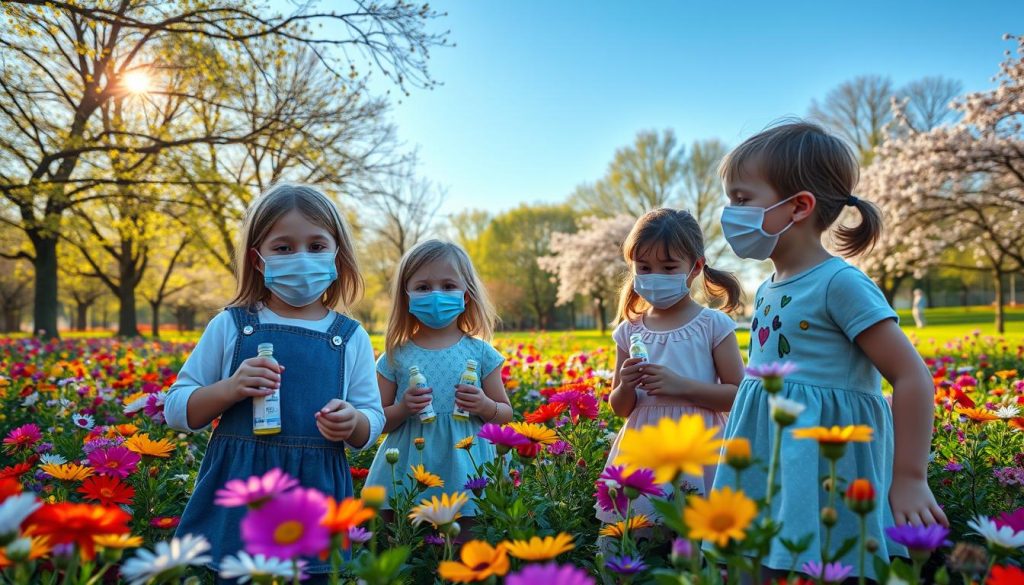
Here’s a quick guide on symptoms and how to handle children’s pollen allergies:
| Symptom | Management Strategy |
|---|---|
| Runny or Stuffy Nose | Use saline sprays or drink more water |
| Itchy, Watery Eyes | Try allergen-free eye drops and keep windows closed when pollen is high |
| Frequent Sneezing | Stay inside when pollen counts are high and use HEPA filters |
| Respiratory Distress | See a pediatrician about using inhalers or other medicines |
Knowing and managing allergies is key to a better life for your child all year. By spotting allergies early and using the right pediatric allergy management steps, you can lessen the symptoms of children’s pollen allergies.
Predicting Pollen Allergy Severity Each Season
As seasons change, knowing when allergy season will be bad is key for those with pollen allergies. This info helps people get ready and doctors give better advice.
Many things affect how bad the allergy season will be. Weather, how plants grow, and even city growth matter. But, the pollen in your area is especially important for local allergy forecasts.
Factors That Influence Pollen Levels
Weather is a big factor in pollen levels. A mild winter can make plants pollinate early. Rainy springs can make allergies last longer by helping plants grow. Wind speed and direction also play a part, making pollen travel farther.
Understanding Regional Differences in Pollen Allergies
Different places have different pollen problems because of local plants. For example, the Midwest deals with more grass pollen, while the East Coast has more tree pollen. Knowing these differences helps make allergy forecasts more accurate. This lets people plan ahead and take steps to avoid allergies.
Using local data in allergy forecasts helps health experts and those with allergies. It makes it easier to deal with pollen each year.
Debunking Myths About Allergic Rhinitis
We need to clear up allergic rhinitis myths for better health. Many false ideas about nasal allergies make it hard to manage and treat this common issue.
The truth about nasal allergies is often hidden by old beliefs and wrong info. By looking at these myths with medical facts, we can understand and manage allergic rhinitis better.
| Myth | Truth |
|---|---|
| Only children are affected by allergic rhinitis. | Allergic rhinitis can occur at any age, affecting both adults and children. |
| Nasal allergies are just minor annoyances. | Without proper management, they can significantly impair quality of life and lead to other health issues. |
| Flowers are often the most common trigger for nasal allergies. | Grasses, weeds, and tree pollen are more frequent triggers of allergic rhinitis. |
| Moving to a different climate can cure allergic rhinitis. | While symptoms might improve in a new environment, allergic rhinitis is not curable and can adapt to new allergens over time. |
Knowing the real truth about nasal allergies helps in making better treatment plans. It’s key for those affected to talk to doctors for a correct diagnosis and treatment that fits their needs.
By fighting myths, we help those with allergic rhinitis feel better and live better lives.
Conclusion
In this article, we explored the challenges of pollen allergies. We looked at the obstacles and the ways to overcome them. Now, our readers are better equipped to handle the pollen season with confidence.
Embracing allergy season might seem tough, but knowing about allergies gives us power. It helps us take back our comfort and health. Understanding our struggles lets us grow and improve our health.
The fight against pollen allergies is a shared journey. We all face the same challenges and seek the same relief. By tracking pollen counts and creating allergen-free spaces, we get closer to a sneeze-free season.
Community support is key. It brings us together and shows we’re not alone in our allergy battles. It’s important to remember we’re all in this together.
Let’s move forward with determination and a focus on allergy awareness. We have the tools and knowledge to manage allergens easily. Sharing our experiences and insights can help us all enjoy a better allergy season.
FAQ
Q: What are common pollen allergy symptoms?
A: Symptoms of a pollen allergy include itchy, watery eyes and a runny nose. You might also sneeze a lot and feel sinus pressure. An itchy or sore throat can also happen. Knowing these signs can help you get the right treatment.
Q: How can I tell if I have a pollen allergy?
A: If you get allergic rhinitis symptoms during certain seasons, you might have a pollen allergy. Notice when your symptoms start and how long they last. This can help figure out if pollen is the cause.
Q: When should I check the pollen count?
A: Check the pollen count daily in spring and fall if you have allergies. This helps you plan your day and avoid pollen.
Q: What is the difference between seasonal allergies and perennial allergic rhinitis?
A: Seasonal allergies happen in specific seasons, usually because of pollen. Perennial allergic rhinitis lasts all year and can be caused by things like dust mites or pet dander.
Q: What are some strategies to reduce pollen exposure at home?
A: Close windows when pollen is high, use air purifiers, and shower after being outside. Also, use allergen-proof covers for your bedding to keep pollen out.
Q: Are over-the-counter medications effective for pollen allergy relief?
A: Yes, you can find relief with over-the-counter meds like antihistamines and nasal sprays. Always talk to a doctor to find the best option for you.
Q: Can children have pollen allergies, and how can I manage them?
A: Children can have pollen allergies too. Watch for symptoms and talk to a pediatrician. Managing their allergies might include medication and reducing exposure to allergens.
Q: How can I predict the severity of pollen allergies each season?
A: The severity of allergies can depend on weather and plant growth. Local pollen forecasts can help predict how bad your allergies will be.
Q: Are there natural remedies for pollen allergy symptoms?
A: Yes, some people find relief with natural remedies like saline rinses or local honey. But always check with a doctor before trying new things.
Q: How do hay fever symptoms compare to pollen allergy symptoms?
A: Hay fever and pollen allergies have similar symptoms like sneezing and itchy eyes. But hay fever specifically means an allergic reaction to pollen.












